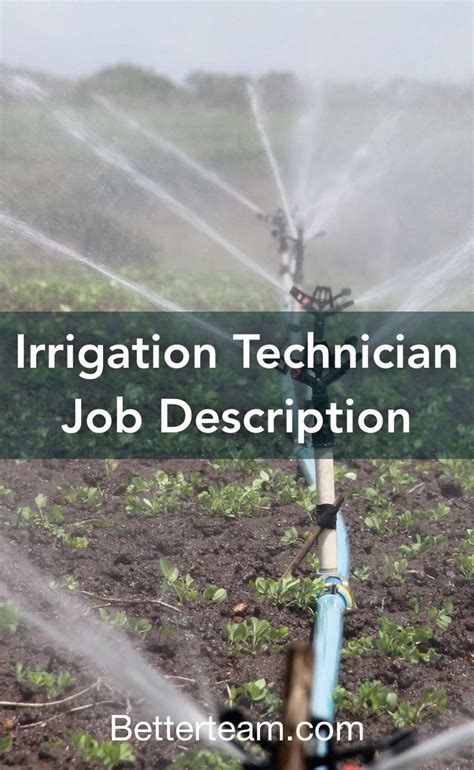The world of irrigation technology is rapidly evolving, and with it, the demand for skilled professionals who can design, install, and maintain these complex systems. If you're looking to build a career in irrigation tech or hire someone to join your team, understanding the key job description essentials is crucial. In this article, we'll break down the top five irrigation tech job description essentials to help you get started.
The Importance of Irrigation Technology
Before we dive into the job description essentials, let's quickly explore the significance of irrigation technology. Irrigation systems play a vital role in modern agriculture, allowing farmers to cultivate crops efficiently and effectively. With the global population projected to reach 9.7 billion by 2050, the need for sustainable and water-efficient irrigation systems has never been more pressing. Irrigation technology professionals are at the forefront of this challenge, working to design and implement systems that conserve water, reduce energy consumption, and promote crop growth.
5 Key Irrigation Tech Job Description Essentials
- System Design and Installation
The ability to design and install irrigation systems is a fundamental requirement for any irrigation tech professional. This involves understanding the principles of hydraulics, water management, and soil science to create efficient and effective irrigation systems. A strong background in CAD design, GIS mapping, and computer-aided modeling is also essential for creating detailed system designs and simulations.

- Water Management and Conservation
Irrigation tech professionals must be knowledgeable about water management and conservation techniques. This includes understanding the principles of evapotranspiration, soil moisture monitoring, and weather-based irrigation scheduling. Professionals in this field must also be familiar with water-saving technologies, such as drip irrigation and precision agriculture, to help reduce water waste and promote sustainable farming practices.

- Electrical and Mechanical Systems
Irrigation systems rely on electrical and mechanical components to operate effectively. Irrigation tech professionals must have a strong understanding of electrical circuits, motors, pumps, and control systems to troubleshoot and repair issues. They must also be familiar with mechanical systems, including pipes, fittings, and valves, to ensure proper installation and maintenance.

- Software and Programming
Many modern irrigation systems rely on software and programming to optimize performance and efficiency. Irrigation tech professionals must be proficient in programming languages, such as Python or C++, and familiar with software platforms, including irrigation management software and SCADA systems. They must also understand data analytics and interpretation to make informed decisions about system performance and optimization.

- Troubleshooting and Maintenance
Finally, irrigation tech professionals must be skilled troubleshooters and maintenance experts. They must be able to diagnose issues with irrigation systems, including electrical and mechanical problems, and perform routine maintenance tasks to ensure optimal performance. This includes tasks such as inspecting and replacing worn components, cleaning filters, and performing software updates.

Conclusion
In conclusion, irrigation tech professionals play a critical role in designing, installing, and maintaining efficient and effective irrigation systems. By understanding the key job description essentials outlined above, you'll be better equipped to build a successful career in this field or hire the right talent to join your team. Remember to stay up-to-date with the latest advancements in irrigation technology and continue to develop your skills and knowledge to remain competitive in this rapidly evolving industry.
Gallery of Irrigation Technology






FAQ Section
What is the average salary for an irrigation tech professional?
+The average salary for an irrigation tech professional varies depending on location, experience, and industry. However, according to the Bureau of Labor Statistics, the median annual salary for irrigation technicians is around $50,000.
What are the most common irrigation system components?
+The most common irrigation system components include pumps, motors, pipes, fittings, valves, and control systems.
How often should irrigation systems be maintained?
+Irrigation systems should be maintained regularly to ensure optimal performance and efficiency. This includes tasks such as inspecting and replacing worn components, cleaning filters, and performing software updates.
